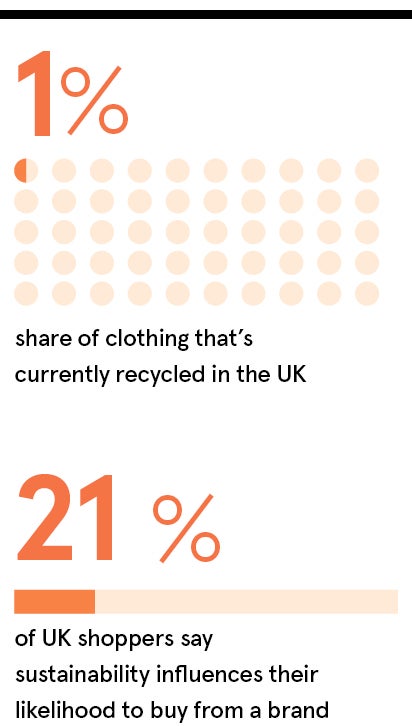Fashion reflects the moods and demands of every era, from the introduction of Sunday trading in 1994 – the same year Amazon launched, ushering in 24/7 shopping – to the British high street’s battle to retain relevance over the past decade, to today’s question of whether fashion can be a truly sustainable industry.
Fashion trade title Drapers has persisted throughout these changes as the leading resource for the fashion business, informing, representing and inspiring industry leaders and startups alike.
We began in 1887, covering the burgeoning women’s clothing trade. More than 130 years later, our news reporting, industry insight, awards and events form an indispensable toolkit for businesses operating at the forefront of the fashion industry. Our more than century-long heritage means we are trusted by readers and clients ranging from ASOS to H&M, YOOX Net-a-Porter Group to Marks & Spencer.
Looking back can be helpful, but what are the key challenges facing the fashion retail sector in 2019 and beyond? The message from industry leaders to Drapers is clear: sustainability has never been higher up the fashion agenda.
Sustainability is no longer an add-on, a nice-to-have or a marketing opportunity; it’s essential to running a fashion business profitably in 2019. Speaking at the Drapers Sustainable Fashion conference this spring, MP Mary Creagh, chair of the House of Commons Environmental Audit Committee, said sustainability is now “a fundamental requirement” for business.
Ms Creagh revealed that less than 1 per cent of clothing is currently recycled in the UK and the average piece of clothing is worn just seven times. Westminster is making moves to curb this, proposing tax breaks for fashion retailers that offer repairs and considering a one-penny producer responsibility charge on each item of clothing.
As a result of this growing pressure, we are witnessing retailers make fundamental shifts to their business practices to make sustainability a core part of their business model. This is happening across the industry, from global conglomerates to small independents.
Marie-Claire Daveu, chief sustainability officer of Kering, owner of luxury fashion houses Gucci, Saint Laurent and Balenciaga, told Drapers sustainability is about change management. “You have to push people to think in a different way. If a company sees sustainability only as a regulation, or a constraint and a cost, that is not sustainability,” she says.
Kering’s billion-dollar business has enabled it to build free-to-use online courses on sustainable luxury fashion with the London College of Fashion; its first intake saw 10,000 students sign up. At the other end of the financial spectrum, small British womenswear label Birdsong is hiring pensioners and low-income migrant women, and paying them above the London living wage to produce its clothes.
 As the British fashion industry’s trade bible, we are used to talking business. But consumers are also leading this change. On the high street and when spending online, a shift in mindset is happening. Data gathered in our Connected Consumer: Multichannel Insight Report reveals just over a fifth of all shoppers (21 per cent) now say a brand’s sustainability record is likely to influence whether they buy or not.
As the British fashion industry’s trade bible, we are used to talking business. But consumers are also leading this change. On the high street and when spending online, a shift in mindset is happening. Data gathered in our Connected Consumer: Multichannel Insight Report reveals just over a fifth of all shoppers (21 per cent) now say a brand’s sustainability record is likely to influence whether they buy or not.
Sustainable practices are becoming habitual with consumers. From abandoning carrier bags to the rise of the #30Wears movement on Instagram, sustainability is gaining momentum, whether brands choose to align themselves with it or not.
Brands that fail to adequately account for their sustainability practices risk, at the very least, looking outdated. At worst they risk a significant hit to their bottom line through poor sales, low staff retention and negative press.
But sustainability is just one of the issues the Drapers team of journalists are reporting on and investigating every day. From riding out Brexit headwinds, to isolating the most useful digital innovations, to building company cultures which attract the best talent, to maximising productivity, we support and connect the sector’s leaders, and provide ideas and solutions to help drive the fashion business forwards.
For more information please visit bit.ly/DrapersTheTimes

